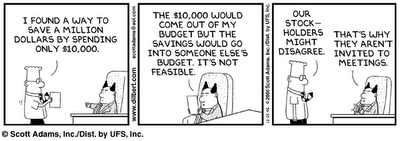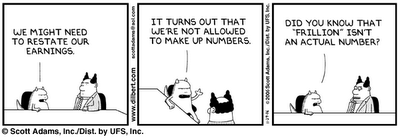Today's edition of the Wall Street Journal has a piece on creating a simple portfolio using three funds - a broad domestic equity fund, a broad domestic bond fund, and an international fund. It's worth a read, and could easily form the basis for the bilk of your portfolio:
Though the idea may not be for everyone, the formula is easy enough: One index fund to cover U.S. stocks, another for the international markets and a third for the U.S. bond market. Together, this trio has rivaled U.S. stock returns over one-, three- and five-year spans, and with more stable returns year-to-year than the broad market. With thousands of fund options, it may seem hard to believe that a portfolio that doesn't even try to beat the market can do a better job than most professional money managers. But in this case, less is more.
The three-fund strategy "makes sense," says Meir Statman, a Santa Clara (California) University finance professor who studies investor behavior. "What makes it hard is that it seems too simple to actually be a winner."
Make no mistake: A blend of bland index funds isn't going to provide you with scintillating cocktail-party conversation to dazzle your friends who own hedge funds or hot sector offerings.
"It's a 'cold shower' portfolio," Mr. Statman says. "You'll do fine, but you'll not have the biggest house in the fanciest neighborhood."
Read the whole thing
here (subscription required).
The idea has a lot going for it.
First, by diversifying across domestic stocks and bonds, you lose some potential for lagrge returns, but end up with much lower volatility. That's more improtant than you might think, because the amount you have in the future is based on geometric, not arithmetic returns.
To see the difference, consider a simple case where you invest $100 and gain 30% one year, then lose 10% the next. Your arithmetic return is simply (0.30 + (-0.10))/2, or 10%. However, your "true" return is the geometric return - you end up turning $100 into $117 over two years (the $100 grows to $130 in the first year, then drops to $117 in the second. So, your geometric average annual return is actually 8.17%. In case you're wondering how I got that figure, to calculate the geometric average return, first take the annual return for each year and add 1. Then multiply the "1+return" for each year, and then take the "nth" root. Then subtract 1.
So, for two years, in an Excel spreadsheet the return would be:
[(1.+0.30)(1 + (-0.10))]^(0.5) - 1
= [(1.30)(0.90)]^(0.5) - 1 = 0.0817, or 8.17%
The higher the volatility of returns (i.e. the more returns fluctuate from year to year), the lower the geometric average return will be relative to the arithmetic average. So, reducing volatility could have a big impact on your future account value.
Adding some international exposure could also further decrease the riskiness of your portfolio, since international equity markets have a fairly low correlation with domestic markets. In addition, there's a good chance that they'll add some return "spice" to your portfolio, since many international markets have higher growth potential due to the higher growth rates of their countries' economies.
Like the article says, it's not a "sexy" portfolio, and it won't give you bragging rights around the water cooler. But it will probably outperform a great many of the alternatives.
 HT: The Conglomerate Blog.
HT: The Conglomerate Blog.
